A rising China needs to demonstrate moral courage on Myanmar issue
Thinking along the lines of moral realism, a concept espoused by Professor Yan Xuetong, dean of the Institute of International Relations at Tsinghua University, China can enhance its international esteem by establishing its moral and strategic credibility on the Myanmar issue, says Professor He Baogang.
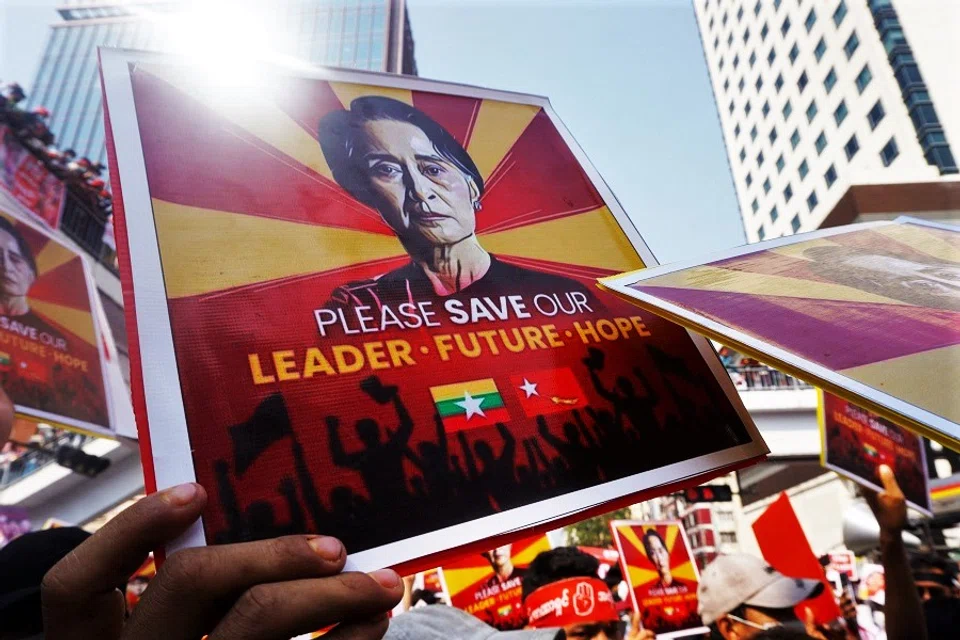
On 1 February 2021, Myanmar's military chief General Min Aung Hlaing led a military coup and detained the elected political leaders. This effectively stopped the parliament from convening and military personnel were reappointed as the heads of the various government departments. China's Global Times has called it a "cabinet reshuffle". In the past four weeks, large-scale civil protests have occurred in various parts of Myanmar. The West has strongly condemned the military regime and China has supported a UN Security Council statement which called for the release of the detained elected leaders of government, including Aung San Suu Kyi.
Japan's foreign minister has claimed that sanctions by the West on Myanmar will nudge the Myanmar military closer to China. In the protests in Myanmar, the PRC flag has been placed together with the Myanmar Tatmadaw's flag, creating the image of complicity between China and the Myanmar military. With the military coup, some believe that Myanmar will resume its previous isolation and that China will continue its support for and become the sole supporter of the military regime, as other nations withdraw their investments from Myanmar. The view that China supports the Myanmar military and benefits from the coup considerably distorts the facts because it fails to recognise that Singapore, South Korea and some Japanese enterprises will not completely withdraw their investments. In addition, it is not viable for the Myanmar military to resume its previous isolation. More importantly, this view is oblivious of the significant changes in China's Myanmar policy.
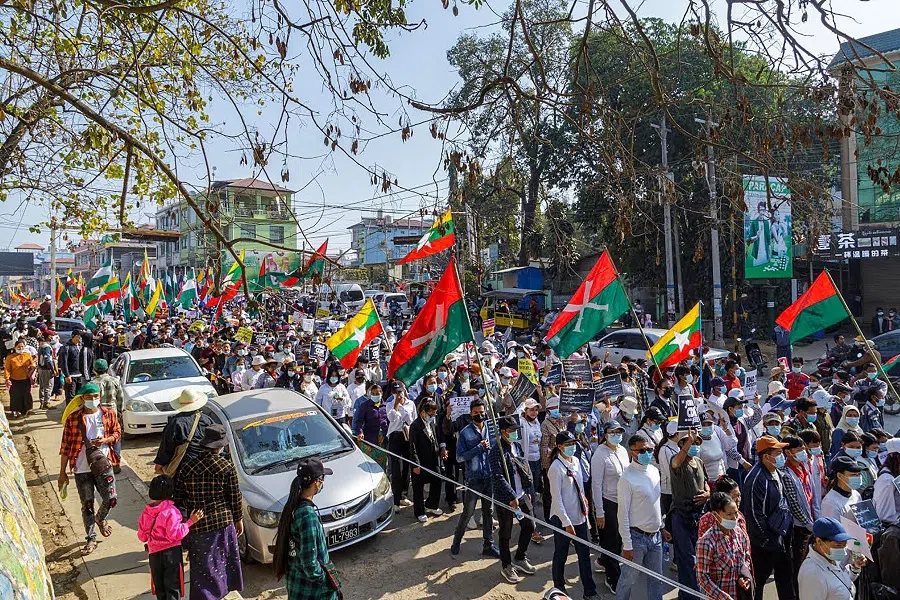
The purpose of this article is to clarify the prejudice of the Western media through a discussion of the changes in China's Myanmar policy. The article also explores whether China can gradually make the transition from absolute realism and be guided by the principles of moral realism, as described by Professor Yan Xuetong, dean of the Institute of International Relations at Tsinghua University, in its response to the military coup in this new era. (NB: The theory suggests that, inter alia, that "it will be possible for China to change the international system in the 21st century if it practices the moral principles of fairness, justice, and civility both at home and abroad".) Of course, the new measures of moral realism in foreign policy remain as theoretical discussions amid the constraints of China's domestic politics and the changing global politics.
Evidently, a democratically elected government on its own does not pose a threat to China's security.
China's changing Myanmar policy
Indeed, China had supported Myanmar from 1988 to 2011 when the West sanctioned Myanmar's military regime. However, in the past five years, China has quietly changed its approach to Myanmar's military regime. During the early stages of implementing the Belt and Road Initiative (BRI), China was willing to deal with authoritative regimes because they provided political stability. As the BRI implementation moves from broad strokes to a stage of sophistication, China appears to be more willing to deal with democratically elected governments, which the Chinese government and enterprises prefer over military regimes.
The elected Myanmar government, led by the National League for Democracy (NLD), has been trying to reduce corruption and govern by the rule of law. Aung San Suu Kyi had demonstrated democracy, impartiality and transparency in handling the disputes involving Chinese copper mining companies in Myanmar, which was well-received by Chinese companies. President Xi Jinping signed contracts for major projects when he visited Myanmar in January 2020, securing the licence for the Kyaukpyu deep-sea port project. In fact, the concrete breakthrough for BRI implementation in Myanmar has been achieved through cooperation with the NLD.
Initially, China was concerned that a democratically elected government, supported by the West, would lean towards the West and away from China. The two visits to Myanmar by former US President Obama during his presidency added to Beijing's concern about the shift in Myanmar's security strategy. However, the five years of NLD governance has shown that even an elected government cannot sever its economic ties with China. On the contrary, Aung San Suu Kyi has emphasised independence and neutrality in foreign affairs. Evidently, a democratically elected government on its own does not pose a threat to China's security.
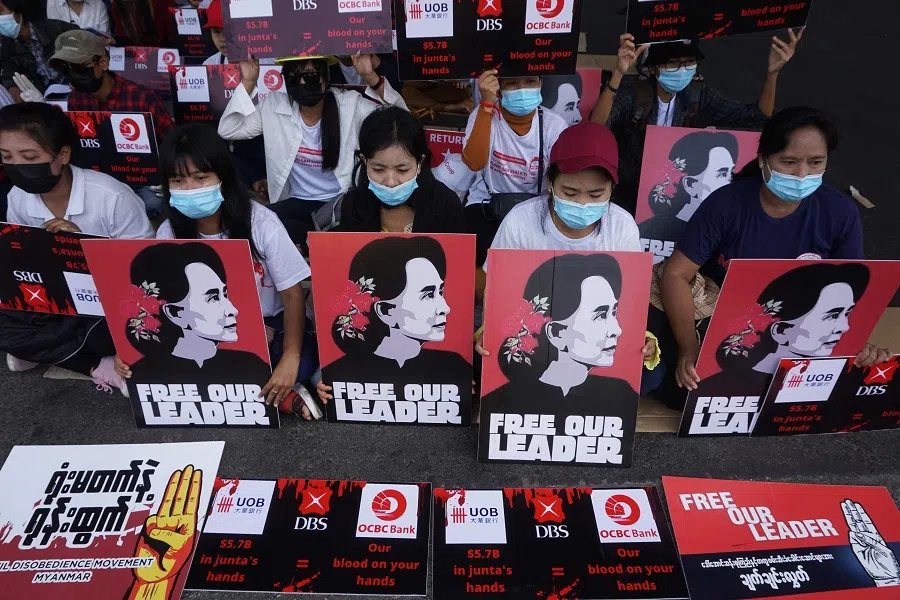
It can be inferred from the above that subtle changes have taken place in China's approach to Myanmar's military regime. After 2015 and until the coup, Myanmar's government was an amalgamation of the NLD and the military - the former held socio-economic power while the latter continued to control the national defence, the nation's borders and civil affairs. While China deals with both the democratically elected government and the military, it no longer supports the military regime as strongly as before.
At an informal UN meeting on 27 February, China's Permanent Representative to the UN Zhang Jun elaborated on China's policy on the situation in Myanmar, expressing his hope "that all parties in Myanmar will ... properly handle differences through dialogue and consultation under the constitutional and legal framework, ... and continue to promote the domestic democratic transformation process in an orderly manner". China has emphasised "parties", "constitution", "consultation" and "promot[ing] the domestic democratic transformation". I can further boldly hypothesise that a new policy scenario will emerge: the next few years will mark a turning point in the Chinese government's changed approach towards the Myanmar military regime. The reasons are as follows:
China likely to seek a distance from Myanmar military
First, from the perspective of comparative politics, the US had first supported the military regimes in Taiwan, South Korea and Indonesia to curb the spread of communist regimes in Asia. As this need dwindled, the US economically supported the civilian regimes and democratisation because the costs of supporting a military regime were too high. Historically, military regimes have played a role during the early stages of rapid economic development. However, when Taiwan and South Korea became economically more developed and attained a certain level of importance in the global economy, their astute military leaders and supporters increasingly felt the economic pressure to abandon military rule, having realised that the military regimes were unable to meet the needs of advanced economic development. As it happened, under the pressures of the people and the US, the military regimes in Taiwan and South Korea eventually ended. Similarly, with fewer geopolitical considerations (since a democratically elected government does not necessarily pose a threat to China's security) and to meet the needs of China's economic development, China wants its neighbouring nations to establish and consolidate civilian regimes that emphasise laws and regulations.
The lack of moral principles in China's position on the Myanmar military coup is one of the reasons that has further contributed to this perception. Myanmar scholars and officials whom I know are very unhappy with China's description of the military coup as a cabinet reshuffle!
Second, from the perspective of the BRI, military regimes are not conducive for the overseas expansion and development of China's economy. The essence of military politics is a regime that is based on rule by military might. Although military regimes sometimes abide by global economic rules for survival, General Min Aung Hlaing's brazen declaration that the election results are illegitimate has already violated the current rules of politics. This behaviour can easily be applied to existing international economic contracts. The success of the BRI requires civilian regimes that respect the rule of law. China's enterprises prefer a formalised, institutionalised and normalised political environment. While military regimes may arguably be bribed for the sake of expediency, civilian regimes are clearly better for long-term interests and economic development.
The success of the BRI projects in Myanmar depends on China's efforts to change the Myanmar people's terrible perception of China, that it always supports the Myanmar military and opposes democratisation. The lack of moral principles in China's position on the Myanmar military coup is one of the reasons that has further contributed to this perception. Myanmar scholars and officials whom I know are very unhappy with China's description of the military coup as a cabinet reshuffle!
Naturally, one of the important reasons for China's reluctance to publicly condemn the Myanmar military is its adherence to the principle of non-interference in other nations' domestic affairs as well as its readiness to deal with authoritarian governments for extended periods of time. However, can China remain silent in the event of large-scale bloodshed in future protests? China's moderate attitude and reticence appear very passive and weak against the moral voices of the West.
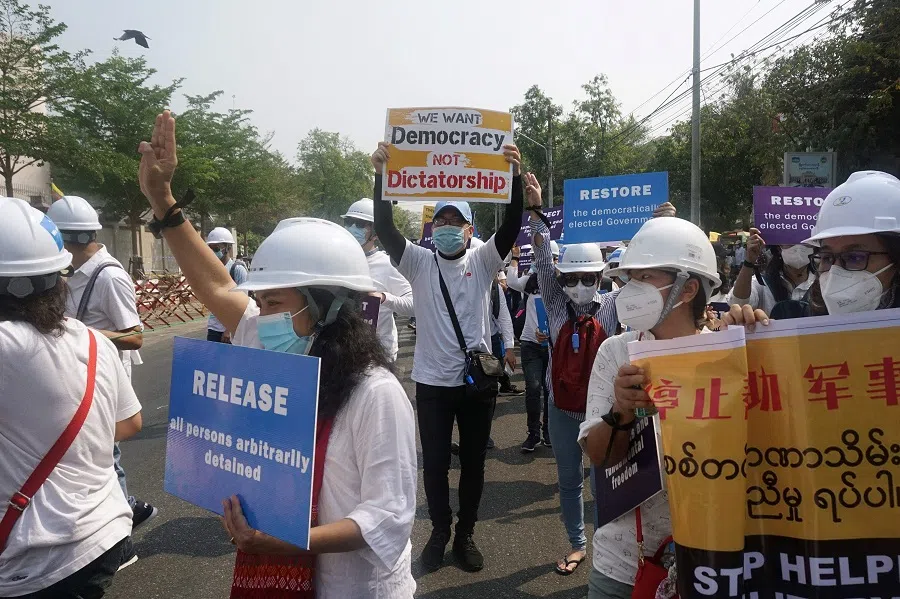
Third, China's emergence, growth and global leadership require an image of moral courage and objection to the military coup. In the 21st century, it is immoral to overthrow an elected government by sheer power and might. If China deals with an immoral and illegitimate military regime, it will only hurt China's moral image and damage the growth of China's soft power. While benefiting from such opportunities may yield some conveniences, it will ultimately be detrimental to China's long-term development. Military regimes in Africa and Asia have collapsed one after another, with those in Thailand and Myanmar barely hanging on. (Strictly speaking, Thailand is currently not a military regime, with its limited parliamentary politics controlled by the military.)
US hegemony in Asia relies not only on supporting military regimes but also on ending them. Similarly, China's leadership in Asia today must be linked to ending the remaining military regimes in Asia. Now, Beijing needs to rethink its policy towards Myanmar's military regime, explore new measures in this new era, and build the image of China's peaceful emergence based upon the mission to end Myanmar's military regime. These require brand-new moral ethics to guide new foreign policies.
The emerging China can enhance its ability in global political mobilisation by establishing its moral and strategic credibility on the Myanmar issue.
China and ASEAN are fine-tuning their policies of non-interference in other nations' domestic affairs. Recently, Indonesia attempted to exert pressure on Myanmar's military regime through ASEAN, requesting that observers be despatched to Myanmar during its November 2020 elections to ensure fairness. The world is watching China and expects Beijing to publicly condemn the military regime and provide a practical solution. One of the landmark historical events in the rise of the US is its mediation of the Russo-Japanese War. Likewise, China's emergence will require some landmark international events or major disputes, which China can provide practical solutions to resolve. The Myanmar situation offers such an opportunity.
The next few years will be the best window of opportunity to apply Professor Yan Xuetong's moral realism to foreign policy. The emerging China can enhance its ability in global political mobilisation by establishing its moral and strategic credibility on the Myanmar issue.
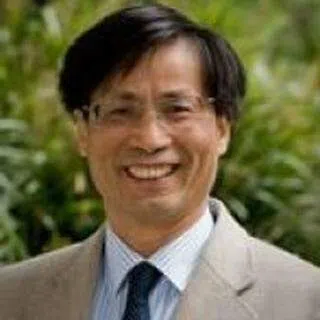


![[Big read] When the Arctic opens, what happens to Singapore?](https://cassette.sphdigital.com.sg/image/thinkchina/da65edebca34645c711c55e83e9877109b3c53847ebb1305573974651df1d13a)
![[Video] George Yeo: America’s deep pain — and why China won’t colonise](https://cassette.sphdigital.com.sg/image/thinkchina/15083e45d96c12390bdea6af2daf19fd9fcd875aa44a0f92796f34e3dad561cc)
